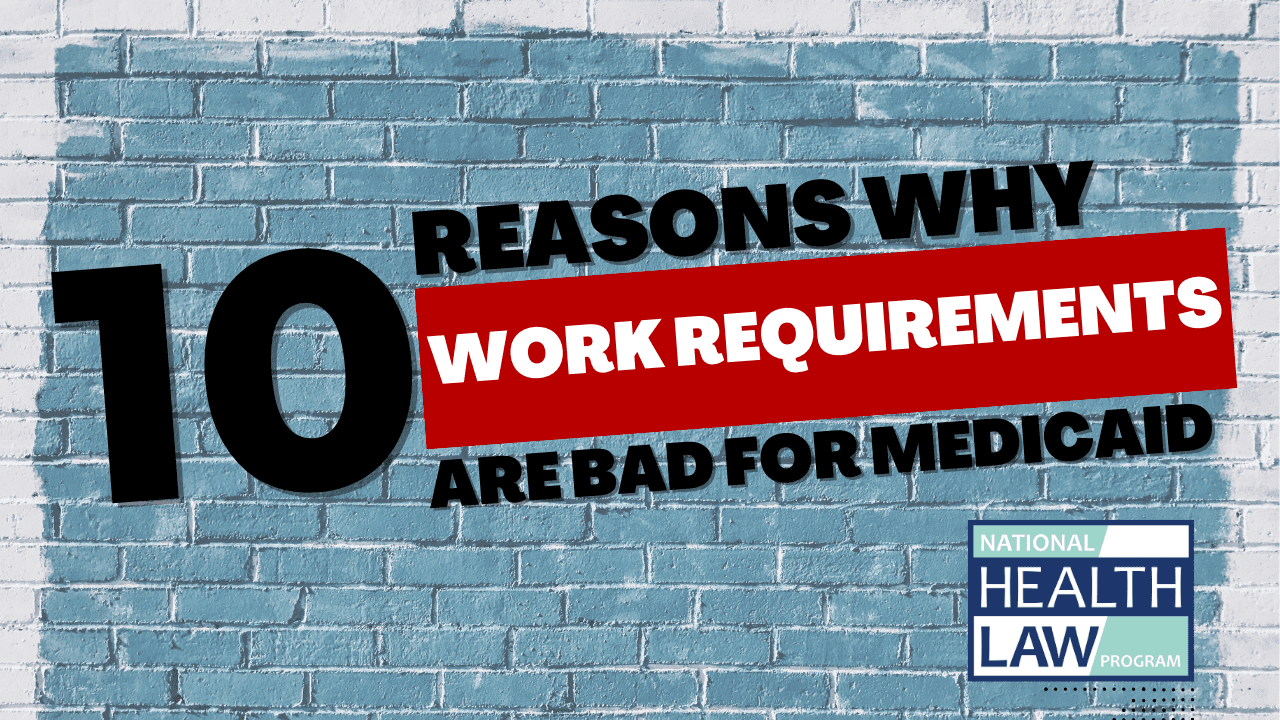Top 10 Reasons Why Work Requirements Are Bad for Medicaid
This blog was originally published as a fact sheet. A PDF version can be found here.
House of Representatives Speaker McCarthy recently released his long-awaited bill to address the debt ceiling. As expected, he included a provision to impose work requirements on Medicaid enrollees. Work requirements act as a wolf in sheep’s clothing – they may sound like a good idea to some people but they generate a morass of paperwork and documentation requirements, add costs for states to administer, and leave too many – including older adults and people with disabilities — without any health care coverage at all.
Medicaid is not a program designed to increase employment. Its objective is to provide comprehensive health coverage so low-income people can get the affordable care they need. Still, fully 91% of Medicaid enrollees are workers, students, caregivers, or not working due to illness or disability. Medicaid coverage often enables work. Evidence suggests Medicaid helps more people work, including people with disabilities whose employment participation increased when Medicaid coverage expanded. If the goal is to increase employment, supports like Medicaid, affordable child care and job training are the foundation. We already know they work.
McCarthy’s proposal is not about supporting people. In contrast, it is designed to take healthcare coverage away. Work requirements are designed to trip people up, and then blame them for falling. Some workers will lose coverage because low-wage work is by nature unstable and inconsistent. Their employer will cut their hours or put them on the late shift when their children are home from school. In short many will not be able to meet the monthly requirements due to no fault of their own. Older adults or people with disabilities who face major barriers to work may never learn how to apply for an exemption, will not fit the vague definitions for exemptions, or will lack key verification documents. Sending in a doctor’s form or requiring a copy of weekly paystubs is a hassle that people struggling to pay their bills and keep food on the table do not need.
Work requirements always create more red tape. In every program where work requirements have been implemented, a large share of participants have lost coverage simply because the process to show they were working (or qualified for an exemption) was too complicated or difficult to access. Work requirements “save” money by having fewer enrollees. An analysis from the Congressional Budget Office (CBO) found that a less expansive national Medicaid work requirement would still result in 2.2 million adults losing Medicaid coverage per year (and subsequently experiencing increases in medical expenses).
Here are the Top 10 Reasons why McCarthy’s work requirements provision is bad for Medicaid:
- Work requirements do not improve health. Being in poor health is associated with an increased risk of job loss. Access to affordable health insurance has a positive impact on people’s ability to get and maintain employment. Arkansas is the only state that actually implemented work requirements in Medicaid to date. In addition to more than 18,000 of Arkansas’ Medicaid enrollees losing coverage, the work requirements led to worse health and economic outcomes for those affected. People reported delaying care, rationing medication, and incurring increased medical debt.
- Work requirements do not improve income. Most enrollees who can work are already working full-time. Those who are not working often are caregiving, attending school, or experience barriers to employment such as a lack of accommodations and services for disabilities. Many low-wage jobs just do not offer health insurance or affordable insurance, making Medicaid essential to provide access to care to remain able to work.
- Sufficient work hours are often unavailable. Even if an individual finds regular work, documenting it every month could be challenging. According to the Kaiser Family Foundation, many Medicaid adults who work part-time (30% of all workers) cited that reasons for working part-time include work limits like shorter work weeks (less than 35 hours per week) (12%), slack work/business conditions (14%), or inability to find full-time work (6%) Or if their schedules change, as many low-wage jobs do, they may meet requirements one month but not another and they could risk losing Medicaid only to become eligible again the next month. This churn of people on-and-off would add burdens to individuals to re-apply and state Medicaid agencies to process applications.
- Paperwork burdens and red tape increase exponentially. Every state would have to develop an entirely new administrative system to identify, track and document both those who have to meet work requirements and those who would be exempt, and track them every month. In Arkansas, nearly half of the population targeted by work requirements reported never hearing of the policy or was not sure it applied to them. As highlighted in PBS NewsHour, Adrian McGonigal, a full-time worker in Arkansas, lost his Medicaid because the notice the state sent was difficult to understand, he believed that he only needed to verify his work hours once, instead of every month as required.
- Every Medicaid enrollee would be affected. McCarthy’s proposal applies to everyone enrolled in Medicaid. While it seems that many individuals should be exempt from the work requirements, everyone will have to document their exemption. This monstrous paperwork would burden all Medicaid enrollees (not to mention cash-strapped states), even those to whom McCarthy says the requirements should not apply. Further, Medicaid plays a disproportionate role in providing coverage to people of color due to issues including systemic racism and a lack of educational opportunities. Medicaid should help reduce health disparities, not exacerbate them as work requirements would.
- Exemptions for people with disabilities would let people fall through the cracks. McCarthy’s proposal applies across the Medicaid program, and exemptions are no panacea. People with disabilities would still need to obtain documentation from a medical professional, and the bill does not define what it means to be “unfit for work.” SNAP has a similarly structured exemption, but it has not worked well. One study from Franklin County, Ohio found that one-third of individuals required to participate in a SNAP employment and training program to keep their benefits reported a physical or mental limitation. Additionally, almost 20% of these non-exempted individuals had filed for SSI or SSDI within the previous two years.
- Medical providers would have to document exemptions. Individuals who are “unfit for employment” qualify for an exemption if they get a statement from a medical professional that they cannot work. Many adults on Medicaid have high rates of functional disability and serious medical conditions, especially among those not working. But they would have to get a “physician or other medical professional” to document this, adding burdensome requirements on both enrollees and medical professionals. What would satisfy this request? How often would enrollees have to provide documentation? The documentation requirements and the subjective judgment of medical professionals would inevitably lead to people with disabilities losing access to the only program that covers the support services they need to live (and work) in the community.
- Waivers would not be allowed. McCarthy’s proposal would not allow states who do not want to have work requirements to request waivers. The bill does not permit any changes or exceptions, even if states determine the work requirement provisions were too onerous. In any case, Medicaid waivers are only allowed for experiments that are innovative and it is hard to imagine an experiment that would test the effect of not having a work requirement let alone be approved by any Administration that supports work requirements.
- Work requirements make it harder to get reproductive and sexual health care. Work requirements will only serve to further gut access to reproductive and sexual health care for people with low incomes, and especially parents, Black, Latinx, and other people of color, and people with disabilities. Protecting Medicaid is a sexual and reproductive health and justice imperative.
- Transportation issues impede work. Many Medicaid enrollees would find meeting work requirements difficult to meet due to lack of transportation, particularly in rural areas. This proposal would not address those barriers.
As evidenced in Arkansas, rather than promoting work, work requirements did not increase employment, led to adverse health consequences, and caused thousands to lose coverage. That number could be millions if implemented nationwide.






